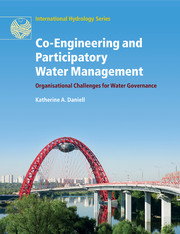
-
Select format
-
- Publisher:
- Cambridge University Press
- Publication date:
- June 2012
- May 2012
- ISBN:
- 9780511998072
- 9781107012318
- 9781108446495
- Dimensions:
- (276 x 219 mm)
- Weight & Pages:
- 1.19kg, 346 Pages
- Dimensions:
- (280 x 216 mm)
- Weight & Pages:
- 0.89kg, 345 Pages
You may already have access via personal or institutional login
Book description
Effective participatory water management requires effective co-engineering – the collective process whereby organisational decisions are made on how to bring stakeholders together. This trans-disciplinary book highlights the challenges involved in the collective initiation, design, implementation and evaluation of water planning and management processes. It demonstrates how successful management requires the effective handling of two participatory processes: the stakeholder water management process and the co-engineering process required to organise this. The book provides practical methods for supporting improved participatory processes, including the application of theory and models to aid decision-making. International case studies of these applications from Australia, Europe and all over the world, including Africa, are used to examine negotiations and leadership approaches, and their effects on the participatory stakeholder processes. This international review of participatory water governance forms an important resource for academic researchers in hydrology, environmental management and water policy, and also practitioners and policy-makers working in water management.
Contents
Metrics
Full text views
Full text views help Loading metrics...
Loading metrics...
* Views captured on Cambridge Core between #date#. This data will be updated every 24 hours.
Usage data cannot currently be displayed.
Accessibility standard: Unknown
Why this information is here
This section outlines the accessibility features of this content - including support for screen readers, full keyboard navigation and high-contrast display options. This may not be relevant for you.
Accessibility Information
Accessibility compliance for the PDF of this book is currently unknown and may be updated in the future.

